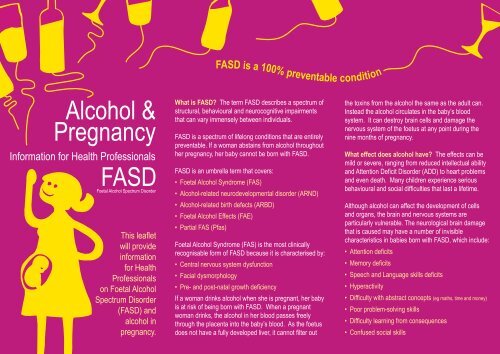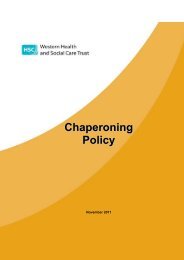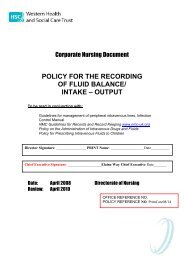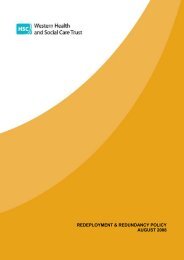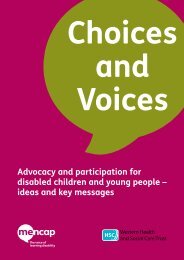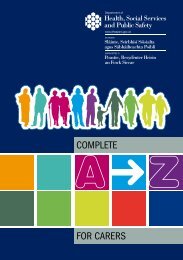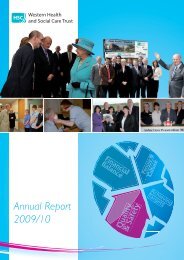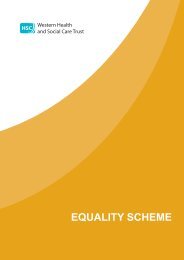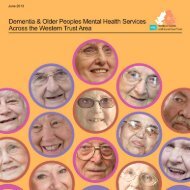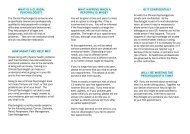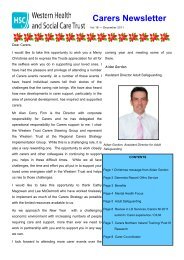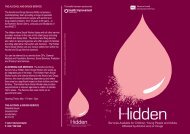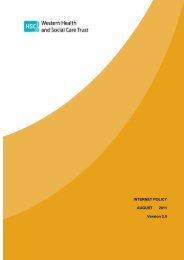FASD Leaflet 2013 - Western Health and Social Care Trust
FASD Leaflet 2013 - Western Health and Social Care Trust
FASD Leaflet 2013 - Western Health and Social Care Trust
Create successful ePaper yourself
Turn your PDF publications into a flip-book with our unique Google optimized e-Paper software.
<strong>FASD</strong> is a 100% preventable condition<br />
Alcohol &<br />
Pregnancy<br />
Information for <strong>Health</strong> Professionals<br />
<strong>FASD</strong><br />
Foetal Alcohol Spectrum Disorder<br />
This leaflet<br />
will provide<br />
information<br />
for <strong>Health</strong><br />
Professionals<br />
on Foetal Alcohol<br />
Spectrum Disorder<br />
(<strong>FASD</strong>) <strong>and</strong><br />
alcohol in<br />
pregnancy.<br />
What is <strong>FASD</strong>? The term <strong>FASD</strong> describes a spectrum of<br />
structural, behavioural <strong>and</strong> neurocognitive impairments<br />
that can vary immensely between individuals.<br />
<strong>FASD</strong> is a spectrum of lifelong conditions that are entirely<br />
preventable. If a woman abstains from alcohol throughout<br />
her pregnancy, her baby cannot be born with <strong>FASD</strong>.<br />
<strong>FASD</strong> is an umbrella term that covers:<br />
• Foetal Alcohol Syndrome (FAS)<br />
• Alcohol-related neurodevelopmental disorder (ARND)<br />
• Alcohol-related birth defects (ARBD)<br />
• Foetal Alcohol Effects (FAE)<br />
• Partial FAS (Pfas)<br />
Foetal Alcohol Syndrome (FAS) is the most clinically<br />
recognisable form of <strong>FASD</strong> because it is characterised by:<br />
• Central nervous system dysfunction<br />
• Facial dysmorphology<br />
• Pre- <strong>and</strong> post-natal growth deficiency<br />
If a woman drinks alcohol when she is pregnant, her baby<br />
is at risk of being born with <strong>FASD</strong>. When a pregnant<br />
woman drinks, the alcohol in her blood passes freely<br />
through the placenta into the baby’s blood. As the foetus<br />
does not have a fully developed liver, it cannot filter out<br />
the toxins from the alcohol the same as the adult can.<br />
Instead the alcohol circulates in the baby’s blood<br />
system. It can destroy brain cells <strong>and</strong> damage the<br />
nervous system of the foetus at any point during the<br />
nine months of pregnancy.<br />
What effect does alcohol have? The effects can be<br />
mild or severe, ranging from reduced intellectual ability<br />
<strong>and</strong> Attention Deficit Disorder (ADD) to heart problems<br />
<strong>and</strong> even death. Many children experience serious<br />
behavioural <strong>and</strong> social difficulties that last a lifetime.<br />
Although alcohol can affect the development of cells<br />
<strong>and</strong> organs, the brain <strong>and</strong> nervous systems are<br />
particularly vulnerable. The neurological brain damage<br />
that is caused may have a number of invisible<br />
characteristics in babies born with <strong>FASD</strong>, which include:<br />
• Attention deficits<br />
• Memory deficits<br />
• Speech <strong>and</strong> Language skills deficits<br />
• Hyperactivity<br />
• Difficulty with abstract concepts (eg maths, time <strong>and</strong> money)<br />
• Poor problem-solving skills<br />
• Difficulty learning from consequences<br />
• Confused social skills
No alcohol is the best <strong>and</strong> safest choice<br />
There are also a number of possible physical effects<br />
including:<br />
• Smaller head circumference<br />
• Heart problems<br />
• Limb damage<br />
• Kidney damage<br />
• Damage to the structure of the brain<br />
• Eye problems<br />
• Hearing problems<br />
• Specific facial characteristics<br />
baby by avoiding alcohol. As a <strong>Health</strong>care Professional,<br />
if you suspect a pregnant woman might be drinking<br />
alcohol, early intervention is the most effective way of<br />
improving the outcome for both mother <strong>and</strong> baby.<br />
An empathetic, non-judgemental approach encourages<br />
a positive response.<br />
Visit www.nofas-uk.org/ for further information on<br />
<strong>FASD</strong> <strong>and</strong> Alcohol <strong>and</strong> pregnancy.<br />
Alcohol &<br />
Pregnancy<br />
Information for <strong>Health</strong> Professionals<br />
<strong>FASD</strong><br />
Foetal Alcohol Spectrum Disorder<br />
How many people are affected? The incidence of<br />
<strong>FASD</strong> in the United Kingdom <strong>and</strong> internationally is not<br />
accurately known. Many children born with <strong>FASD</strong> are<br />
not diagnosed, or do not receive a correct diagnosis,<br />
which makes calculating the prevalence of the condition<br />
extremely difficult.<br />
The World <strong>Health</strong> Organisation (WHO) estimates that 1<br />
in 100 babies is born with alcohol-related damage.<br />
Advice for pregnant women: There is no proven safe<br />
level for alcohol consumption during pregnancy; the only<br />
risk-free approach is to avoid alcohol completely.<br />
At any stage of pregnancy, a woman can benefit her<br />
The <strong>Western</strong> <strong>Health</strong> <strong>and</strong> <strong>Social</strong> <strong>Care</strong> <strong>Trust</strong> would like<br />
to thank NOFAS for the contribution of information to<br />
this leaflet.<br />
Design <strong>and</strong> illustration: Michael @ <strong>Western</strong> <strong>Trust</strong>, <strong>Health</strong><br />
Improvement Department


